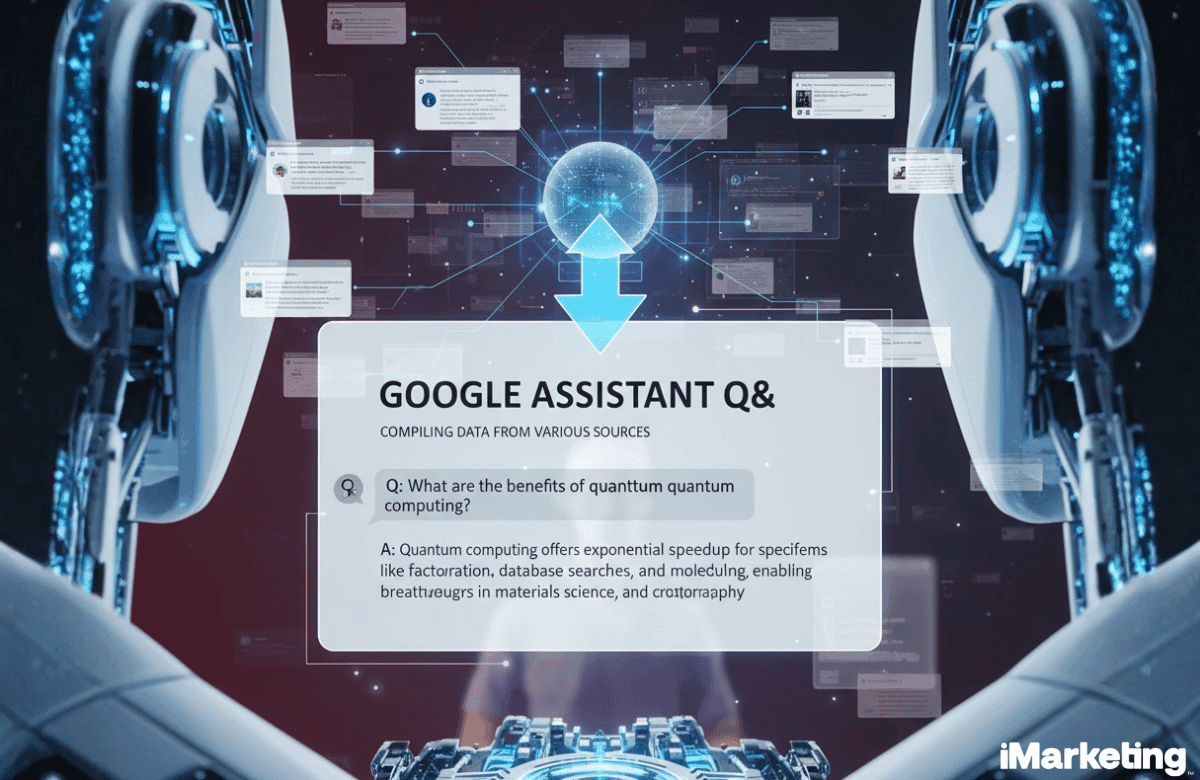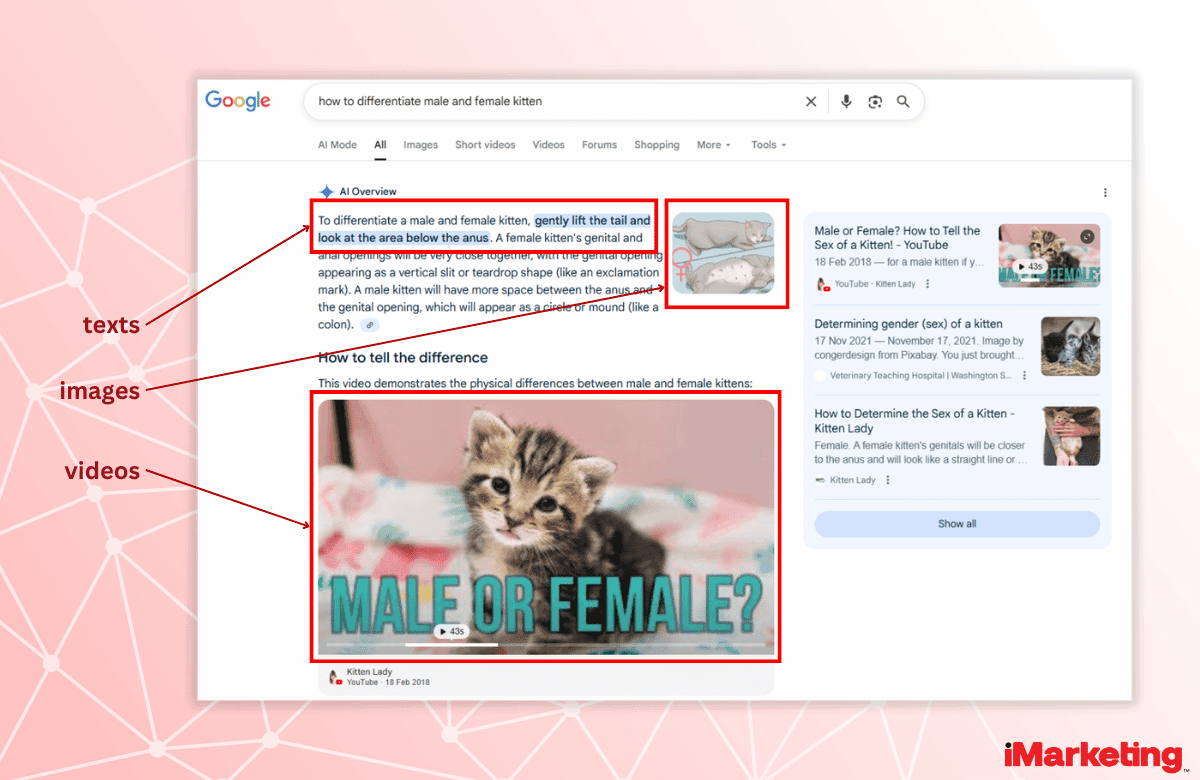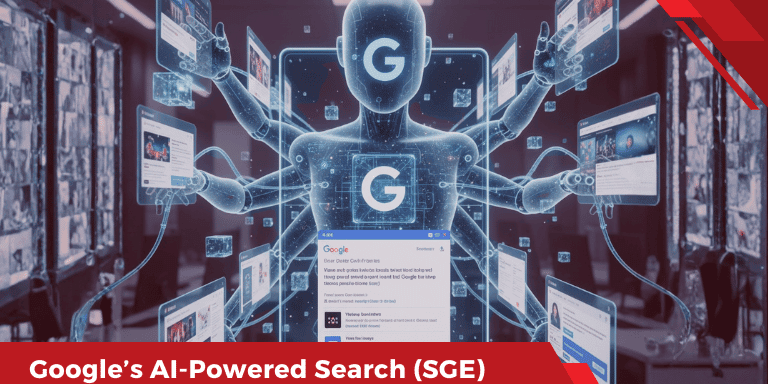Google’s AI-powered search, also known as Search Generative Experience (SGE), is changing the way websites are ranked. AI is now at the core of how search engines understand and deliver content. As a result, optimizing your website for Google’s AI search is crucial for maintaining visibility and ranking. In this guide, we will walk you through the practical steps you need to take to ensure your website is optimized for SGE.
By following these strategies, you will help Google’s AI understand and present your content more effectively, making it easier for users to find and engage with your site. Let’s dive into the details of what you need to do.

What is Google’s AI-Powered Search (SGE)?
Google’s AI-powered search uses advanced algorithms to understand search intent and provide more relevant results. Unlike traditional search, which relies heavily on keywords, AI focuses on understanding the meaning behind queries. It looks at context, relationships between words, and the user’s behavior to generate answers that best match their needs.
AI technology, particularly natural language processing (NLP), is at the heart of this shift. Google’s SGE combines NLP with machine learning to analyze and understand both content and user intent. As a result, search results are more conversational and contextually relevant.
For you, this means that optimizing for AI involves more than just using keywords. It’s about creating content that answers questions directly, provides value, and is aligned with user intent. If your content doesn’t match these expectations, it’s likely to rank lower, even if you use all the right keywords.
The Role of AI in SEO
AI is transforming SEO by shifting the focus from traditional keyword optimization to understanding user intent. Google’s AI-powered search uses machine learning to interpret and rank content based on how well it answers user queries, rather than just matching specific keywords.
Here’s how AI impacts SEO
- Search Intent Over Keywords: AI can now understand the context behind a search query. It looks for content that directly answers the user’s question, rather than just relying on matching specific keywords.
- Personalized Search Results: AI tailors search results based on user history and preferences. This means your website must offer value to a wide range of users.
- Semantic Search: AI understands the relationships between words and phrases. For instance, it recognizes that “buying shoes” and “shoe shopping” likely have the same intent, even if the exact phrases aren’t a match.
To optimize for AI, you need to focus on creating high-quality, relevant content that provides clear, direct answers to the questions your audience is asking. Your website should be optimized for user experience, with easy navigation and clear, structured content. This is how AI evaluates and ranks websites today.
How SGE Affects Content Ranking
Google’s Search Generative Experience (SGE) fundamentally changes how content is ranked. Instead of just focusing on keywords, SGE prioritizes content that aligns with search intent and provides clear, actionable information. Here’s how it affects your website ranking:
- Contextual Understanding: SGE evaluates content based on context, not just keyword matches. Google’s AI assesses how well your content answers a user’s query and whether it fits within the context of their search.
- High-Quality, Relevant Content: Content that directly addresses user intent, is well-structured, and provides valuable insights will rank higher. SGE rewards content that answers questions clearly and comprehensively.
- AI-Generated Summaries: With AI-powered summaries, Google may show short snippets of your content in search results. To optimize for this, ensure your content is easily scannable with well-structured headings, bullet points, and concise information.
- Featured Snippets: SGE increases the prominence of featured snippets, or direct answers to search queries. To improve your chances of appearing in a snippet, focus on creating clear, concise, and informative content that directly answers questions.
For you, this means that it’s no longer enough to focus solely on SEO basics like keyword density. You need to produce content that addresses user questions in a more detailed and useful way. Make sure your content is structured to provide quick answers to the most common questions in your niche.
Top Strategies to Optimize Your Website for Google’s AI Search
To successfully optimize your website for Google’s AI-powered search, you must focus on several strategies that align with the AI’s understanding of context, intent, and user experience. These strategies go beyond traditional SEO techniques, ensuring that your content is not only discoverable but also meaningful to Google’s AI.
1. Focus on High-Quality, Informative Content

Google’s AI prioritizes content that provides clear, valuable answers to user queries. To ensure your content ranks well, it needs to address user intent and provide depth.
- Answer questions directly: Identify the most common questions your audience asks and ensure your content provides clear, concise answers.
- Be comprehensive: Don’t just skim the surface. Provide detailed explanations, examples, and data to back up your claims.
- Use structured data: Implement schema markup to help Google understand your content’s context and improve its visibility in search results.
2. Prioritize User Experience (UX)
Google’s AI values a positive user experience. A well-optimized website enhances AI’s ability to rank it higher in search results.
- Mobile optimization: Ensure your website is fully responsive and mobile-friendly. With more users browsing from mobile devices, Google’s AI gives higher preference to mobile-optimized websites.
- Fast loading times: Page speed is a critical factor. Aim for an optimal Core Web Vitals score to meet Google’s performance standards.
- Easy navigation: Simplify your site’s navigation to ensure users can easily find what they are looking for. Google’s AI uses engagement metrics like bounce rates to gauge content quality.
3. Use Natural Language and Long-Tail Keywords
AI is designed to understand natural language, so your content should reflect how people naturally search for information.
- Write conversationally: Avoid keyword stuffing and focus on providing clear, natural answers to user queries. Google’s AI values content that mirrors the way people speak.
- Target long-tail keywords: Focus on more specific, longer queries that are highly relevant to your audience. These keywords tend to have lower competition and can lead to higher conversions.
4. Embrace Visual and Multimedia Content
Google’s AI-powered search doesn’t just rank text; it evaluates all forms of content, including images, videos, and interactive elements.

- Optimize multimedia content: Use relevant images, videos, and infographics to enhance your content. Ensure your images have descriptive alt text and file names.
- Video content: Create short, informative videos that explain complex topics in an easy-to-understand format. AI considers video content as valuable, especially when it answers user questions.
5. Focus on E-A-T (Expertise, Authoritativeness, Trustworthiness)
Google’s AI evaluates E-A-T signals when determining the quality of content. Websites with strong E-A-T are more likely to rank higher.
- Show expertise: Highlight your qualifications, experience, or any credentials that support your authority in your industry.
- Build trust: Ensure your content is accurate, well-researched, and transparent. Citing reputable sources and offering clear disclosures can improve your trustworthiness.
- Gain authoritative backlinks: Work on acquiring backlinks from authoritative sites within your niche. Google’s AI uses backlinks as a key indicator of authority.
6. Technical SEO for AI Optimization
Google’s AI relies on technical SEO to better understand and rank your content.
- Implement structured data: Use schema markup (like Article, FAQ, HowTo) to help Google understand your content’s context and improve the chances of appearing in featured snippets.
- Optimize for Core Web Vitals: Ensure your site meets Google’s standards for loading speed, interactivity, and visual stability.
- Fix crawl errors: Regularly check Google Search Console to identify and fix crawl errors. This ensures Google’s AI can index your pages properly.
These strategies help you align your website with Google’s AI-powered search, improving both your rankings and user engagement. By focusing on content quality, UX, and technical SEO, you set your website up for success in this new AI-driven search environment.
Technical SEO for AI Search Optimization
To ensure your website is optimized for Google’s AI-powered search, it’s crucial to focus on the technical aspects of SEO. Google’s AI evaluates your site not only based on content but also on its technical performance.
Implementing Structured Data (Schema Markup)
- What is schema markup?
Schema markup is code added to your website that helps search engines understand the context of your content. It improves AI comprehension by organizing data into formats that search engines can process more easily. - Why use it?
By adding structured data, you enable Google’s AI to interpret your website’s content better, leading to higher chances of appearing in rich results like Google AI Overview, featured snippets, knowledge panels, and more.
Optimizing for Core Web Vitals and Page Speed

- Core Web Vitals
Google uses Core Web Vitals to measure the user experience of a website. This includes metrics like Largest Contentful Paint (LCP), First Input Delay (FID), and Cumulative Layout Shift (CLS). Optimizing these factors is crucial for ranking high in AI-driven search. - Page Speed
AI considers page speed as a major ranking factor. Slow-loading pages not only harm user experience but can also hurt your rankings. Aim for fast load times, typically under 2.5 seconds, to meet Google’s expectations.
How to Use AI-Driven Tools for Performance Analysis
- AI tools like Google’s PageSpeed Insights, Search Console, and third-party software can help identify performance gaps.
- Optimize based on AI-driven insights to improve page speed, mobile usability, and overall performance. Continuous use of these tools ensures your site remains aligned with Google’s AI expectations.
The Importance of Continuous Optimization
SEO is not a one-time task, especially with Google’s evolving AI algorithms. As AI technology progresses, it’s critical to continuously optimize your website to keep up with changes and maintain your rankings.
Google’s AI algorithms are always improving. What works today might not work tomorrow, so staying up to date is key to long-term success. As search intent and AI capabilities shift, so should your SEO strategy. If you’re not actively updating your content and website, your search rankings will likely drop.
Regular content updates are necessary to keep your site relevant. Focus on refreshing older content, adding new insights, and ensuring that it reflects the latest trends and data. Also, stay on top of Google’s updates, particularly those related to AI and machine learning advancements. These updates could change the way content is ranked and how search results are delivered.
Data analytics play a significant role in optimizing for AI search. Track performance metrics like impressions, CTR, and bounce rates using tools like Google Analytics and Search Console. This data helps you understand how Google is interpreting your content and whether adjustments are necessary.
You should also use A/B testing to test different strategies. For example, compare page headlines, content formats, or layout changes to see which ones perform best with both users and Google’s AI.
Common Mistakes to Avoid in SGE Optimization
When optimizing for Google’s AI-powered search, avoiding certain mistakes will help you maintain strong rankings and keep your website on track.
- Keyword stuffing and irrelevant content hurt your ranking. Google’s AI can detect when content is overly optimized for keywords without adding value. Instead, create content that answers user questions directly and provides real value.
- Ignoring user intent will lower your rankings. Google’s AI understands the intent behind searches, so your content must align with what users are actually looking for. Always ensure your content provides clear, direct answers to users’ queries.
- Failing to stay updated on AI-related changes can harm your SEO efforts. Google’s AI and search algorithms are constantly evolving. Keep up with Google’s updates to ensure your content strategy stays effective and in line with the latest AI advancements.
Conclusion
Optimizing your website for Google’s AI-powered search is no longer optional, but it’s a necessity. As AI continues to evolve, understanding how it works and adapting your SEO strategies will ensure your website remains competitive.
A user-first SEO approach is key to succeeding in Google’s AI-powered search. Focus on providing value, answering user queries, and ensuring a seamless experience across your site. Stay informed, adapt continuously, and use the insights provided by AI tools to refine your strategy.
Contact the best SEO agency in Malaysia to stay ahead of Google’s AI-powered search and keep your website ranking high.






